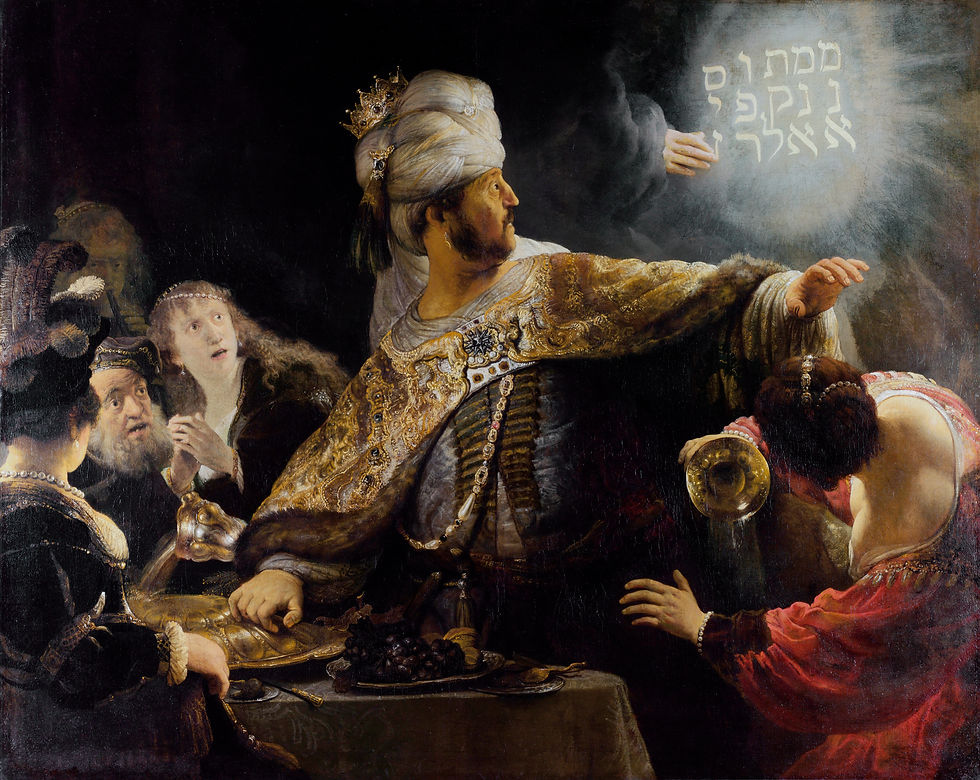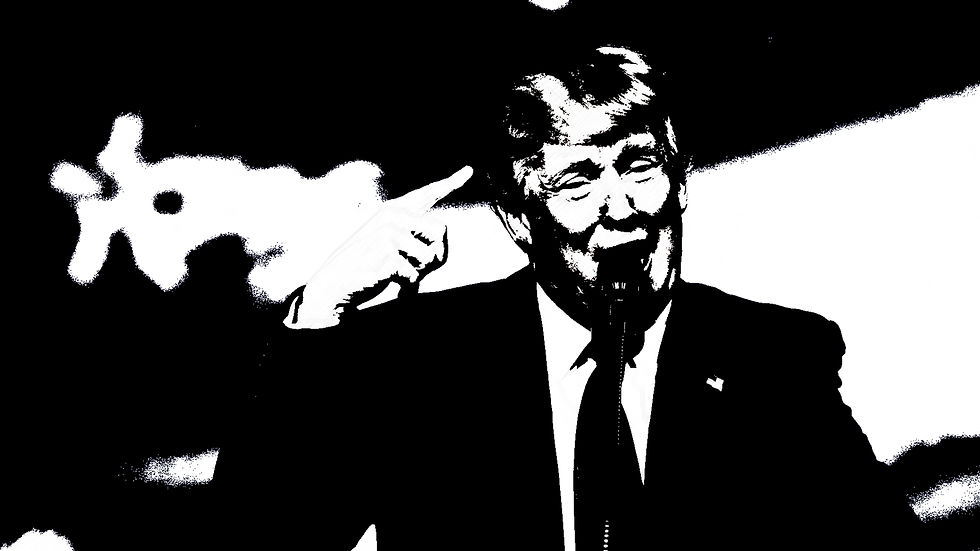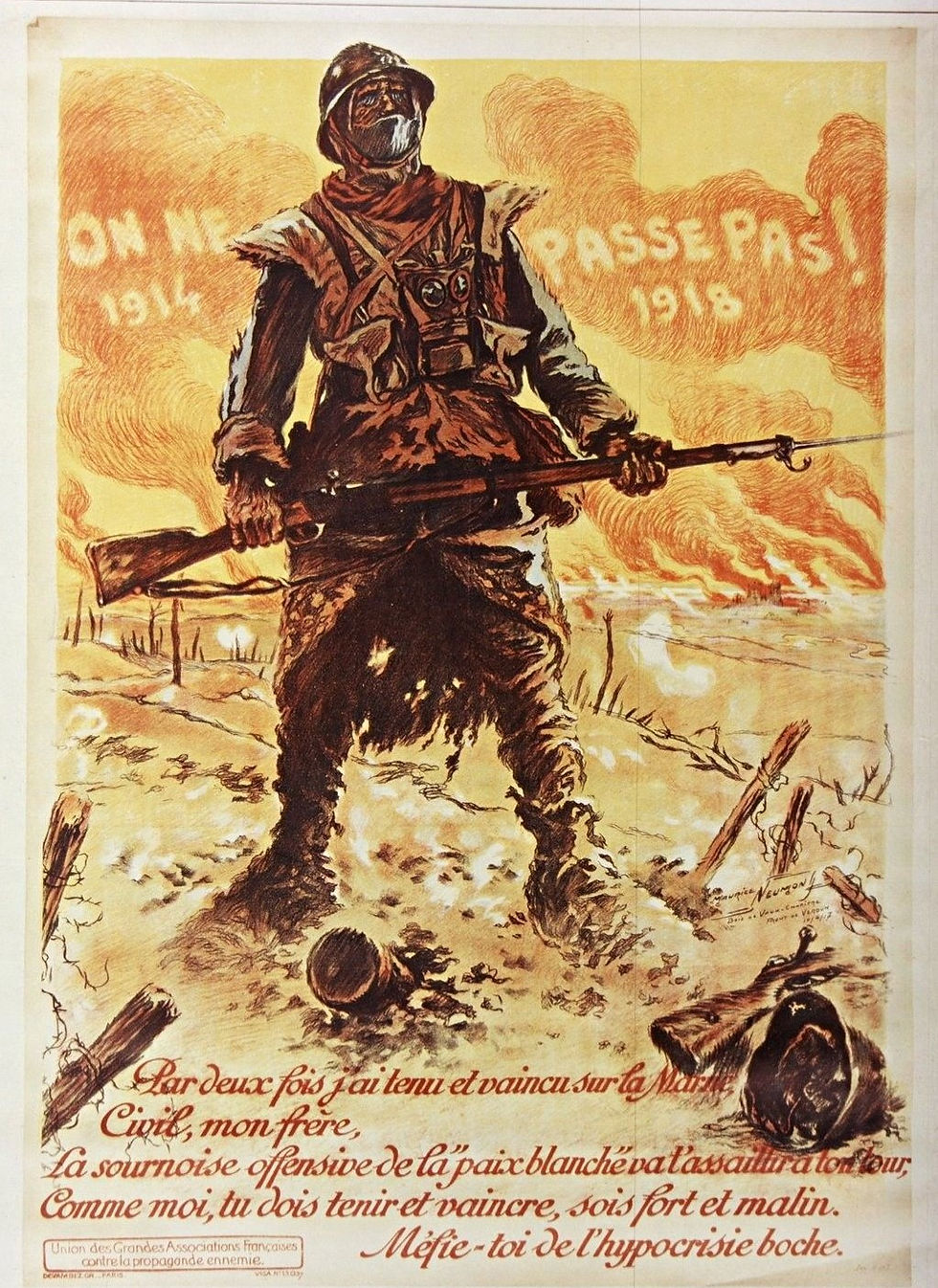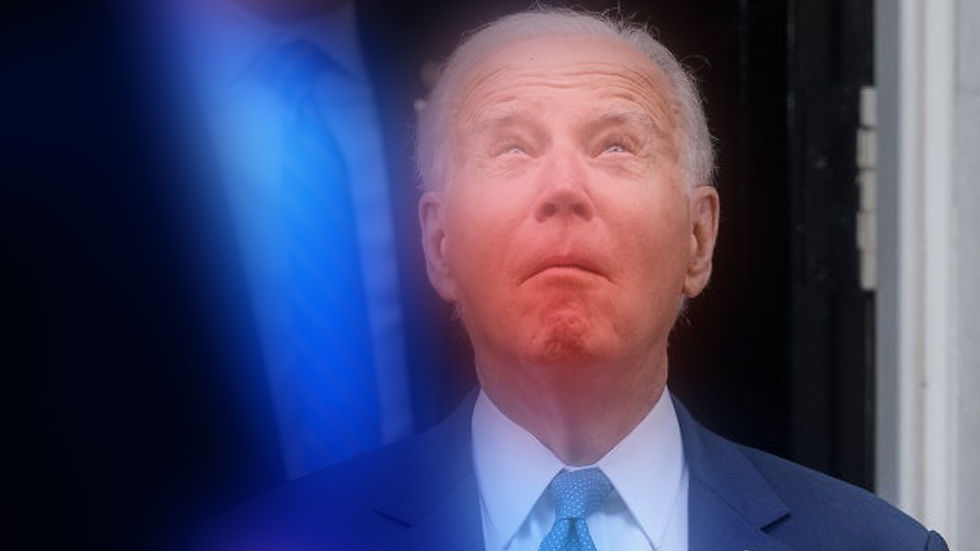Episode 1: Crisis, Charisma, and the Commentariat

Rembrandt
"MENE, MENE, TEKEL, UPHARSIN" [i]
On November 5, 2024 voters will elect Donald Trump President of the United States of America. On January 20, 2025 Trump will be sworn into office as the 47th and last President, at least as that office has been defined for the first 235 years of the American experience.
Minutes after a bizarre inaugural ceremony—tiny hand on Holy Bible, solemn oath, martial music, and other “Hyperion to a satyr” weirdness—President Trump will issue a blizzard of executive orders conferring dictatorial powers upon himself.

Original photo by Gage Skidmore, edited by Second Front
These decrees will gut the ability of Congress and the federal courts to restrain his exercise of executive power.
Members of the Supreme Court will learn that making judicial decrees is one thing. Enforcing them is another. Ditto, Congress, substituting “laws” for “judicial decrees.”
With the exception of three unfortunate groups, most Americans will hardly notice the change. It won’t affect their lives. Many will welcome the new order. This will include some for whom the bell will toll … but at a later date.
Three groups who will be hit hard and fast by the change are (1) immigrants of disfavored origins (primarily Latino and Muslim); (2) residents of high-crime minority neighborhoods; and (3) prominent opponents of Trump, including influential media voices and former friends now labeled traitors.
How could this possibly happen? German sociologist Max Weber explained it all so clearly. But, hey, he was a white guy pondering political order a century ago. So, nobody’s listening to him today.
They should be.
ILS NE PASSERONT PAS!

The commentariat insists that it will not happen.
Like Lauren Boebert on a hot date, Washington-bubble-bound experts are fondling each other’s time series analyses. They conjure optimism by deconstructing the latest polls. No matter how frightening they are on their face—Joe Biden is getting his ass kicked—if you really understand them, they aren’t all that bad.
I insist that—barring medical or criminal intervention—it will happen.
The "punditocracy," the Democratic Party, and Joe Biden have failed to see, correctly analyze, and understand the powerful force that is carrying Trump to victory and unrestrained power.
If they did, Joe Biden would be dumped. Fast.

Our Man Joe!
Some of the commentariat are catching on. Jonathan V. Last, for example, writes about the “cognitive dissonance” involved in Trump’s appeal:
I’m not sure what all of it means—cognitive dissonance is always a part of elections. But this seems to be not just a difference in scale, but a difference in kind. [ii]
Citing the Eugène Ionesco play, Rhinoceros, Charlie Sykes also scents a new force.
This is one of the reasons we so often feel like we’ve taken crazy pills. We keep pretending that we are living in a quasi-normal political universe. The smart kids in PunditWorld fuss endlessly over the horse-race and the latest blips in the Iowa polls, and I’m sitting there going, wait. Wait. Wait. Has anybody noticed that Fred over there has turned into a fucking rhinoceros? [iii]
The abnormal force creating these rhinos is called charismatic leadership.
WHAT THE F***? CHARISMATIC LEADERSHIP!??
When I link charismatic leadership to Donald Trump, my liberal, educated, and never-ever-Trump friends sneer at the thought of “that disgusting man” as charismatic.
That’s understandable, because most of them think of the ordinary dictionary meaning of charisma as “compelling attractiveness or charm.”
But that’s not what I’m talking about.
MAXIMILIAN WEBER’S THEORY
I’m talking about the theory of charismatic political leadership first articulated by the German sociologist Maximilian (“Max”) Weber in 1922:
The term "charisma" will be applied to a certain quality of an individual by virtue of which he is set apart from ordinary men and treated as endowed with supernatural, superhuman, or at least specifically exceptional powers or qualities. These are such as are not accessible to the ordinary person ... and on the basis of them the individual concerned is treated as a leader. [iv]

The essential elements of charismatic leadership in this sense are (1) a people in distress, (2) a leader who convinces them that he is uniquely qualified, (3) to save them. “How the quality in question would be ultimately judged from any ethical, aesthetic, or other such point of view is naturally entirely indifferent for purposes of definition. What is alone important is how the individual is actually regarded by those subject to charismatic authority, by his ‘followers’ or ‘disciples.’” [v]
Max Weber
Princeton Sovietologist Robert C. Tucker wrote that Weber’s theory is “virtually indispensable…for the student of revolutionary movements of various kinds.” [vi] He clarified that, “To be a charismatic leader is not necessarily to be an admirable individual.” [vii]
Weber did not live to see his theory epitomized in Benito Mussolini and Adolf Hitler. But Weber’s theory can help us to understand the attraction and rise to power of authoritarian leaders like Donald Trump.
Over the coming weeks, The Second Front will examine the Trump phenomenon in the context of Weber’s theory. Along the way we’ll visit the careers of Hitler and Mussolini and the enthusiastic admiration that many Americans had for both.
"Be there, will be wild!" [viii]

[i] Daniel 5:25.
[ii] Jonathan V. Last, The Triad, "We Are Living in the Upside Down: Up is down, left is right. Night is day, black is white," January 10, 2024. https://plus.thebulwark.com/p/we-are-living-in-the-upside-down. (Emphasis added.)
[iii] Charlie Sykes, Morning Shots, "Rhinos All The Way Down: An absurdist classic proves prophetic," January 12, 2024. https://plus.thebulwark.com/p/rhinos-all-the-way-down. (Emphasis added.)
[iv] Weber, Max. The Theory of Social and Economic Organization. New York: The Free Press, 1964. [Copyright 1947 by Oxford University Press], 358-59.
[v] Weber, 359.
[vi] Robert C. Tucker. “The Theory of Charismatic Leadership.” Daedalus, Summer, 1968, Vol. 97, No. 3, “Philosophers and Kings: Studies in Leadership” (Summer, 1968), pp. 731-756, 732. https://www.jstor.org/stable/20023840.
[vii] Tucker, 735.
[viii] Donald Trump tweet, December 20, 2020.
Comments